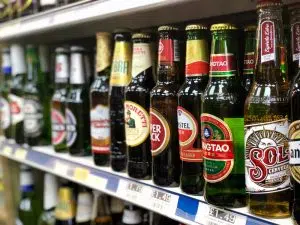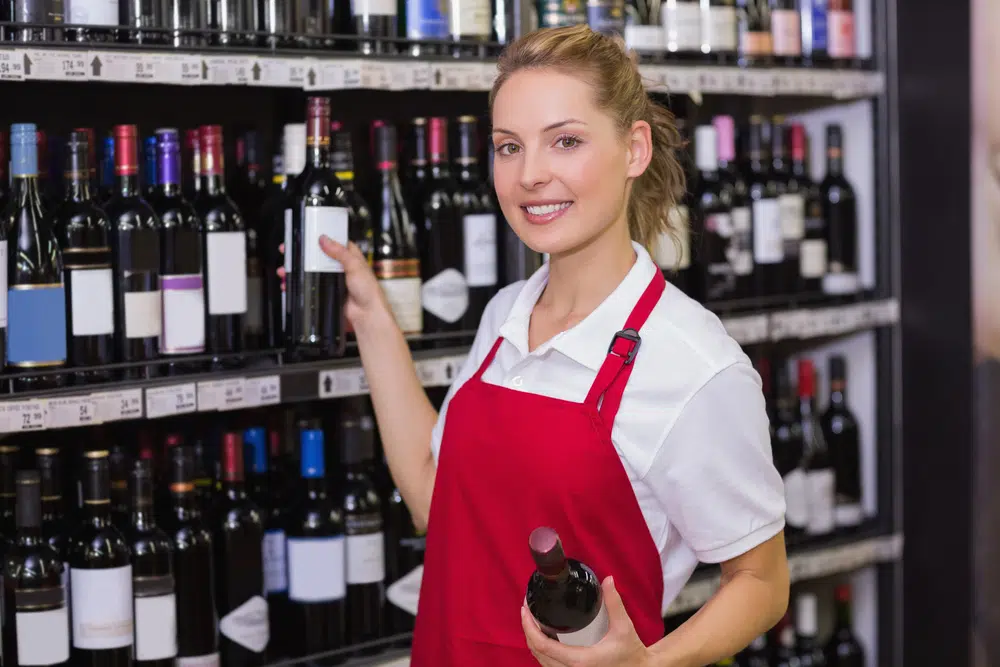
Some also offer convenience items like cigarettes and snacks. In recent years, the advent of online alcohol sales has caused many off-licences to go out of business. However, those that have adapted by offering delivery and click-and-collect services have managed to stay afloat. For many people, an off-licence is the preferred option for buying alcohol, as it offers a wider selection than a supermarket and the prices are often lower than a pub or bar
Are you considering opening an off-licence? It is still possible for an independent business to succeed despite strong competition from the likes of supermarkets. In our handy guide to starting and running a business, you’ll find everything you need.
Research your target market
Planning your off-licence business requires you to do some effective market research in order to learn as much as possible about your potential customers. You will need to hold a personal license if you are looking to offer Under the Licensing Act 2003, anyone authorising the sale (by retail) or the supply of alcohol.
Estimating demand
Your off-licence will need to be well-received in the area before you open it. Take a look at your competition first. Count how many alcoholic drink outlets already exist in your area. There are more and more convenience stores that sell alcohol on forecourts – don’t forget them. Of course, supermarkets and their growing chains of local convenience stores will be among your biggest competitors.
Take note of businesses that stock similar products to the ones you intend to stock. You might offer upmarket wines, unusual spirits, or perhaps just good value everyday drinks, depending on the focus of your business.
Catchment area
Identify the different types of customers you might encounter in the area where you will be operating. As a result, you will be able to determine what products and services you will be able to offer. It is important for major off-licence chains to tailor their products to the local customer base. Find out what your customers might be looking for by comparing the different product ranges in different areas.
Why will customers choose your off-licence
If you want to succeed, you need to attract enough customers to choose your business over others. Take a look at the competition to see:
- Their selection of alcoholic and non-alcoholic drinks
- What other products they offer
- How much they charge
- When are they open?
- What type of customers do they attract?
- If the premises and fittings are modern and stylish
- Services they provide
You might immediately discover that there is a gap in the market for a certain type of off-licence. There may not be many outlets in your area that offer unusual premium beers, for instance. Alternatively, craft gins, like craft beers, have not been catered for. If you want to drive footfall, you might consider offering other services that customers might find useful – such as a cash machine and local delivery service.
Find out what people want
The independent small business is finding it increasingly difficult to survive. In order to find out what’s going on, you should speak to as many local people as possible:
- What products they would like you to carry
- What would be the most convenient opening hours for them?
- Do they have any complaints about the existing off-licences in your area?
Establish your customer profiles
Your market
Among the types of customers, you may have are:
- Local residents
- People who work nearby but live somewhere else
- Trade customers like restaurants, which you might be able to supply wholesale discounts to
Your stock should be matched as closely as possible to your potential customer base, since each type of customer might buy a different type of product.
You may develop a personal relationship with some of your regular customers depending on where you are located.
It is possible for your customers to come from anywhere in the UK if you sell online or through mail order – perhaps cases of wine. You should still encourage people to become regular customers even though you won’t meet them face-to-face.
Depending on who you are, different types of drinks might suit you better. To decide what products to stock, you will need to do some market research – will locals buy expensive fine wines or cheaper alcohol?
Underage drinkers
Obviously, underage drinkers (under 18) should not be sold alcohol. It is unfortunately common for teenagers to attempt to purchase alcohol from you – perhaps by asking an adult to do so. In order to comply with the law, alcohol retailers must have an age-verification policy, so you’ll need to decide how you’ll make sure that underage customers won’t be served.
With initiatives such as CitizenCard and PASS, as well as the British Beer and Pub Association’s Challenge 21, you will always be in compliance with your responsibilities. The law in Scotland requires you to check the age of anyone who seems under 25 using a scheme such as Challenge 25.
Payment method
You might normally receive payment from your customers as follows:
- Cash – this is where customers will most likely spend a relatively small amount
- Customers tend to use credit or debit cards when they spend more money. Cheques may be accepted by trade and account customers, such as local restaurants
If you sell online, you might also be able to accept payments using PayPal or Nochex.
Special offers and discounts
Discounts may be offered on some product lines, or promotions may be offered during certain seasons or in response to popular food and drink TV programs.
Discounts are also offered by off-licences to customers who buy in large quantities. A case of wine might be discounted by 5% to 10%, for example. If customers spend large amounts of money, such as for a function or party, be prepared for further discounts.
It is common for businesses to offer ‘two bottles of wine for a tenner’, although it is important that you still make a profit. It is also important to remember that selling heavily discounted drink is not generally considered as responsible practice, and may lead to an increase in underage drinkers coming into your store to buy alcohol.
Moreover, a few legal issues an off license would need to over come are quantity-based discount promotions are illegal in Scotland (in England and Wales, they are legal, but you will need to charge more than the total value of alcohol duty plus VAT for all the products in the deal. However, you are unlikely to sell them for less than that).
It is important to provide your staff with thorough information about the discounts they can take advantage of. Make sure staff do not offer family and friends unauthorised discounts.
Decide which services to offer
Consider introducing a number of services. Income will be generated by some and footfall will be increased by others, such as:
- Lottery ticket and scratch card sales (National Lottery and/or Health Lottery)
- DVD rental
- PayPoint terminal
- Cash machines
- CollectPlus parcel services
- Free glass loan
- Sale or return on large orders (for example for functions and parties)
- Free local delivery on orders over a certain amount
- Regular wine tastings
If you are going to serve chilled alcoholic and non-alcoholic drinks during the summer, make sure you have adequate refrigeration space.
Quality standards
The supermarkets set the standard for retailing, and it is important for your business to:
- Is clean, tidy, and professionally designed
- Your employees are well-trained and knowledgeable about the products you carry
- Provides a high level of customer service
Advertising your services
The most important thing is that you make your potential customers aware of your business and product range, no matter what services you decide to offer.
Window displays have the potential to attract passing trade – an eye-catching display that is regularly changed will keep passersby interested. If you are introducing new services or products, you can advertise these in your shop window.
The leaflet could outline your stock range and include trade discounts. Hoteliers, guesthouses, and restaurants may be interested in receiving this.
Decide what to sell
Alcoholic drinks are usually available at off-licences, including:
- Red, white, rosé, and sparkling wines are all on the rise, including Prosecco and Champagne
- Liquors and wines fortified with alcohol
- The market for spirits and shots is dominated by gin
- A ready-to-drink cocktail, also known as an alcopops, is a sweetened pre-mixed drink that is ready-to-drink (RTD).
- When major sporting events are taking place, you might want to order extra stock of canned and bottled beer
- Cider and perry, including fruit-flavoured ciders
Among the other product ranges commonly sold are:
- Soft drinks, mineral waters, fruit juices, mixers, non-alcoholic beer, etc.
- Products related to tobacco (sometimes focusing on cigars)
- Snacks such as crisps and nuts
- Ice cream and confectionery
If you want to compete on price and choice with supermarkets, you probably don’t have the space or the resources. As a result, you may decide to:
- Make sure you stock high quality and specialty drinks such as premium beers, malt whiskies, unusual spirits and liqueurs, or vintage wines
- Ensure that the shop and its product range appeal to both men and women
- Offer a variety of luxury snacks and treat foods
- Consider diversifying into other lines, such as newspapers, convenience items, and stationery
- You can increase footfall by adding services such as PayPoint terminals
- Develop trade sales with customers such as restaurants and hotels
Choosing what products and services to offer your customers will be a difficult decision.
Buy an existing business
An off-licence business might be more cost-effective to buy than to start one from scratch. When you purchase a going concern, you may be able to:
- There are already premises and equipment in place
- There may be stock available
- Existing customers
- Income can be generated immediately by the business
- Suppliers have been identified and relationships have been established
- If you are looking for financing, the business has a track record
- It is possible that staff has already been hired
Be sure, however, that you negotiate a fair price with the seller for any business you are interested in. If the business is for sale, find out why it is being sold. The owner may be looking to retire or there may be something else driving the sale. Make sure you research any potential negative reasons for selling up. Are there any planned supermarkets (or c-stores) nearby?
Identify where the company is currently focused – are they targeting value-driven customers with cheap multi-buy deals on standard products, or have they positioned themselves as an upmarket wine retailer? Take into account the local market and general trends in demand for drinks products when choosing its current focus.
You can determine if the owner is selling because he or she cannot generate enough income from the business by researching the sector as a whole and the locality in particular. You may not be discouraged by this – many people are confident that their business can be turned around even if it’s failing. In order to avoid paying too much for the business, it is important to establish the current position first.
Franchises
In between starting out from scratch and buying an existing business, franchising can be a good ‘halfway house’. Although you will still be setting up your own business with a franchise, you will gain the experience, resources, and reputation of an already successful business.
Often, franchisors will provide you with specialised training, stock discounts, marketing and advertising assistance, and technical advice and support.
You and your franchisor will sign a franchise agreement or contract that outlines these points. In addition to the territory exclusivity, you are entitled to and the minimum franchise period, the franchise agreement will also address other matters.
It is advisable to carefully read the terms of a franchise agreement before signing one. Make sure you have your solicitor review the contract before you sign it. On the Franchise Info website, you can learn more about franchising. The British Franchise Association (BFA) also provides information.
Jarred Musson is a versatile writer with a diverse educational background and a passion for all things business. Holding a Master of Science (MSc) degree in Marketing and a Bachelor of Arts (BA Hons) in Multimedia Journalism from Manchester Metropolitan University, Jarred possesses a unique blend of expertise that allows him to dissect and communicate complex business topics with clarity and precision.


